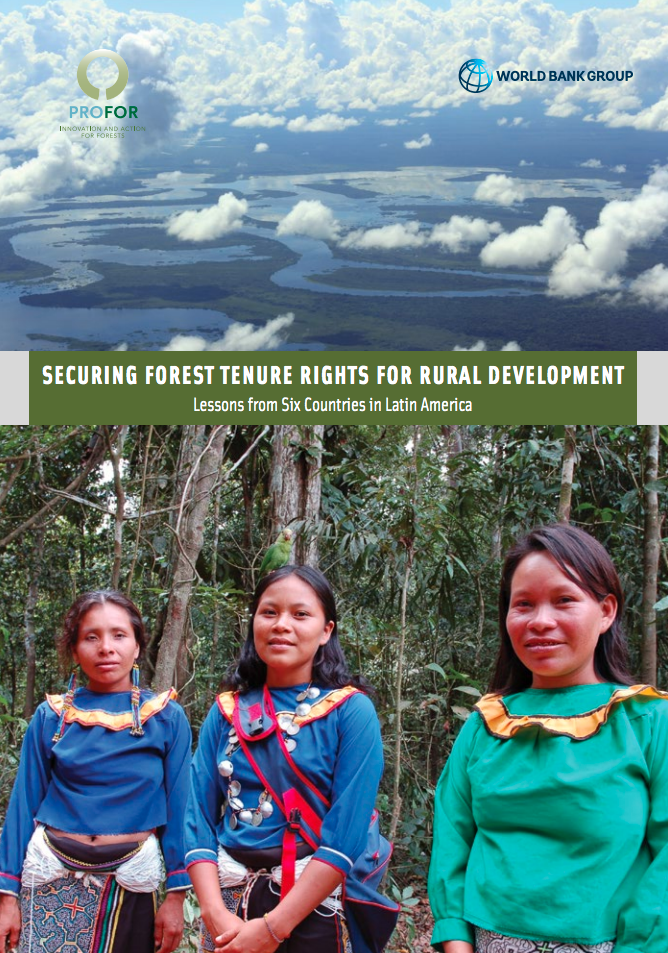The World Bank is a vital source of financial and technical assistance to developing countries around the world. We are not a bank in the ordinary sense but a unique partnership to reduce poverty and support development. The World Bank Group has two ambitious goals: End extreme poverty within a generation and boost shared prosperity.
- To end extreme poverty, the Bank's goal is to decrease the percentage of people living on less than $1.25 a day to no more than 3% by 2030.
- To promote shared prosperity, the goal is to promote income growth of the bottom 40% of the population in each country.
The World Bank Group comprises five institutions managed by their member countries.
The World Bank Group and Land: Working to protect the rights of existing land users and to help secure benefits for smallholder farmers
The World Bank (IBRD and IDA) interacts primarily with governments to increase agricultural productivity, strengthen land tenure policies and improve land governance. More than 90% of the World Bank’s agriculture portfolio focuses on the productivity and access to markets by small holder farmers. Ten percent of our projects focus on the governance of land tenure.
Similarly, investments by the International Finance Corporation (IFC), the World Bank Group’s private sector arm, including those in larger scale enterprises, overwhelmingly support smallholder farmers through improved access to finance, inputs and markets, and as direct suppliers. IFC invests in environmentally and socially sustainable private enterprises in all parts of the value chain (inputs such as irrigation and fertilizers, primary production, processing, transport and storage, traders, and risk management facilities including weather/crop insurance, warehouse financing, etc
For more information, visit the World Bank Group and land and food security (https://www.worldbank.org/en/topic/agriculture/brief/land-and-food-security1
Resources
Displaying 191 - 195 of 4907Re-establishing an Asset Base and Protecting Access to Productive Resources in Post-Conflict areas of Northern Uganda
Northern Uganda is currently recovering from a 20-year long civil war that left the area in ruins. One of the groups, the Lord’s Resistance Army, orchestrated brutal mass murders and abductions forcing nearly two million people to live internally displaced people’s (IDP) camps for over 10 years. The war particularly affected the people of Acholi and Lango sub-regions which had previously suffered sporadic attacks by armed Karamajong cattle rustlers from north eastern Uganda.
Securing Forest Tenure Rights for Rural Development: Lessons from Six Countries in Latin America
Secure land tenure in rural landscapes is widely recognized as an essential foundation for achieving a range of economic development goals. However, forest areas in low and middle-income countries face particular challenges in strengthening the security of land and resource tenure. Forest peoples are often among the poorest and most politically marginalized communities in their national contexts, and their tenure systems are often based on customary, collective rights that have insufficient formal legal protection.
Securing Forest Tenure Rights for Rural Development: Lessons from Six Countries in Latin America
Secure land tenure in rural landscapes is widely recognized as an essential foundation for achieving a range of economic development goals. However, forest areas in low and middle-income countries face particular challenges in strengthening the security of land and resource tenure. Forest peoples are often among the poorest and most politically marginalized communities in their national contexts, and their tenure systems are often based on customary, collective rights that have insufficient formal legal protection.
LAND REGISTRATION DATA STANDARDS, INTEROPERABILITY AND DATA ACCESS IN KENYA.
Land Registration and Administration in Kenya is currently operated on a multi-legal platform [UN 2013]. The Land Registration Act No. 3 of 2012 (LRA) was in that regard enacted to consolidate, harmonize and rationalize land registration goals; which are yet to be achieved. This is majorly because in as much as the 2012 statute repealed five out of the seven major land registration laws, they all remain in force under LRA’s transitional clauses. The Government of Kenya is making efforts to avail land registration information online via the e-citizen platform.
PERSPECTIVES ON PROGRESS AND CHALLENGES OF AFFIRMATIVE ACTION AND THE MAINSTREAMING OF THE COMMONS IN KENYA
The need for affirmative action and the mainstreaming of the commons community plus a comprehensive strategy to secure indigenous and community land has become a major global concern of the 21st century. To achieve this will require out of the box reform mechanisms and the participation of the communities concerned, such that the reforms recognize and embrace indigenous systems and structures that offer avenues to secure collective rights, land use and management of commons resources; namely pastures, water and forests among others.









